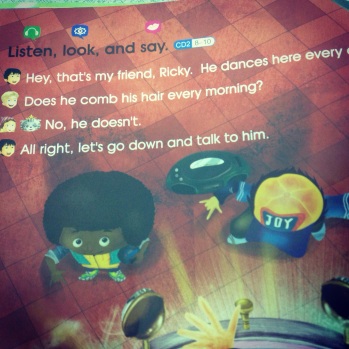There’s a thin veil of power and control when teaching those who don’t share your same native language. Sudents might respectfully listen to what you have to say and maybe they can get the gist it, but inevitably there are times when the inability to articulate instructions in an understood manner results in mutiny: the students can’t understand you so they do what they want or nothing at all. This thin veneer of pedagogical influence is even more frail when dealing with toddlers and preschoolers– those cute uncalibrated snot buckets that I liken to miniature uncalibrated robots.
When hiring for teachers of young learners, many buxibans in Taiwan will ask about classroom management skills. This, I feel, is pointless. It’s easy enough to offer up some bullshit about a foul-proof method you’ve contrived to control thirty or so Taiwanese 5-year-olds whose English proficiency stretches little beyond “Hello how are you? I’m fine, thank you,” but a more honest response might involve explaining how you plan to make an example of the first student who cuts up, no matter how minute the infraction. Answer a question without first raising your hand? Minus 100 stickers. You might send a kid home in tears (it took him all semester to earn those stickers), but the message–this teacher is not to be fucked with– will resonate with the rest of the class, and if you’re lucky, the entire student body.
Regardless of any class management method you employ, at a certain point the kids are so young and the language gap is so wide, that asking a non-Chinese speaking foreigner to brave such a classroom alone is about as useful for teaching English as plopping a group of students down in front of a stereo and cranking up The Very Best of 2 Live Crew.
I teach a very young group of students –we’ll call them the Tangerine class–and luckily I have a Taiwanese co-teacher to help heard them around and fill the lingual gaps during my 2-hour lessons. Eighty percent of the reason I’m able to teach anything is because of her. Among the twelve or so students that I see daily she is both a source for love and trepidation. They turn to her when they’re hurt and cower in front of her when they’ve done something wrong. Her pet peeves are like draconian laws for preschoolers. Run a foul with her and you run the risk of being taken into the bathroom for “readjustment.” Every kid that enters returns teary eyed.
While my co-teacher is in the room the kids are as responsive and well behaved as you’d hope any preschool class of ESl learners would be. There’s always a few laggards, but my instructions are more or less followed and when I need to bring the class back to attention I can usually do so without strain. That’s when she’s in the room.
Believe me when I tell you that if my co-teacher is absent I’m vulnerable to student rebellion.
Eyes watching.
Ears listening.
Mouth quiet.
Hands nicely.
These are the classroom commands that are most effective on a good day. Beyond that, I got nothing. I know it. The students know it. After five minutes solo they begin testing the limits of my patience: the defiant nose picking, sprawling out on the floor, eating pocket lint. At twenty minutes I’m left shouting the same commands that ceased being useful ten minutes ago. Eyes watching, ears listening…
Not all is lost, however. They comprehend and execute “put your book away” with lightning efficiency.
Some teachers employ “the look,” that stern face of dissatisfaction meant to scare students into compliance. With the Tangerines, there’s not a shred of logic behind this tactic. They only understand maybe thirty percent of what I say anyways. Instead of the “look” being synonymous with “Teacher Jeremy is serious,” they interpret it as “please keep screaming at the top of your lungs and continue playing with your saliva.” Maybe it’s a cultural thing.
As young as they are, the students are keen enough to understand that the control I wield over them is easily circumvented due to my lack of Chinese and their lack of English. They agree that as a teacher I have at least a morsel of authoritative power, but beyond that I’m just the facilitator of English games who is to be repeatedly contested or ignored in the absence of their more fearful lao sieuh. The Tomatoes’ perception of me is similar to my perception of any substitute teacher I encountered in the seventh grade: You’re not my REAL teacher hence any interest I show in what you’re doing or saying is provided as a courtesy at best. Unless, of course, I start shilling out candy and Sponge Bob stickers.
Before leaning to ask permission to use the bathroom some of my students would get up in the middle of class and stare me down as they trudged slowly to the toilet, ignoring my every protest which helplessly morph from demands (“Kate, you need to sit down.”), to denial (“Kate, you can’t just get up in the middle of class…”), before finally, acceptance (“Yes, Kate. You may go to the bathroom.”).
With each act of defiance the class grows bolder; my grip on the throne–looser.
This is often accelerated by attention spans that pitter out after about seven seconds. A microscopic dust mite crawling across the floor has the ability to derail a lesson at not even a moment’s notice. Again when my co-teacher is around I have no struggles in getting them refocused. If she’s gone however, and a few students decide to take a mental break (perhaps to admire the wrinkles on their knuckles), it might take ten minutes to get them back on course.
By then it’s snack time and they’ll have successfully orchestrated a thirty minute break from the strange looking teacher whom they can barely understand.
Alas, the struggle continues tomorrow and I’m nearly out of candy and stickers.





 The last few weeks have brought about a lot of change. Kay and I were able to move out of our temporary housing into a spacious two-bedroom apartment that we both enjoy, we were able to set up internet service (though it wasn’t installed until after Chinese New Year) and we survived copious amounts of time spent at Ikea Carrefore, and the ever helpful Daiso (Japan’s take on the dollar store).
The last few weeks have brought about a lot of change. Kay and I were able to move out of our temporary housing into a spacious two-bedroom apartment that we both enjoy, we were able to set up internet service (though it wasn’t installed until after Chinese New Year) and we survived copious amounts of time spent at Ikea Carrefore, and the ever helpful Daiso (Japan’s take on the dollar store).